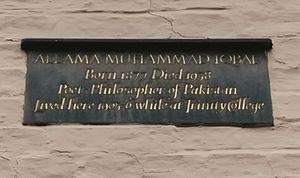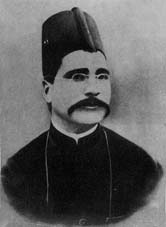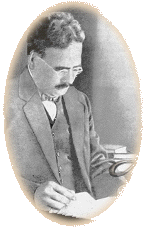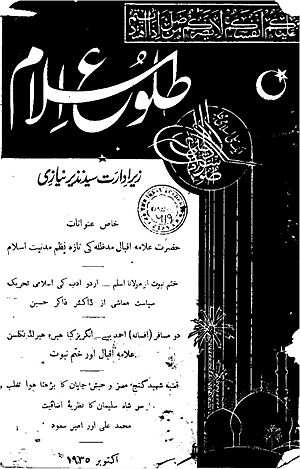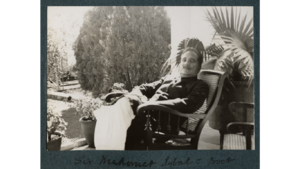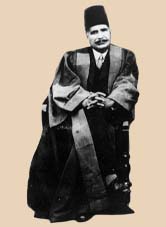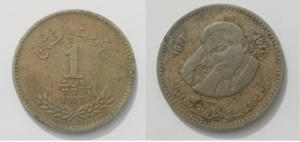Muhammad Iqbal facts for kids
Quick facts for kids
Mufakkir-e-Pakistan
Fakhir-e-Millat Hakim-e-Ummah Ustad Allama Sir Muhammad Iqbal
|
|
|---|---|
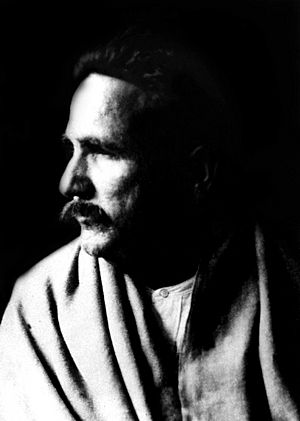
Iqbal, c. 1930s
|
|
| Born | 9 November 1877 |
| Died | 21 April 1938 (aged 60) |
| Education | Scotch Mission College (F.A.) Government College (BA, MA) University of Cambridge (BA) University of Munich (PhD) |
|
Notable work
|
Bang-e-Dara,Tarana-e-Milli, The Secrets of the Self, The Secrets of Selflessness, Message from the East, Persian Psalms, Javid Nama, Sare Jahan se Accha, "Shikwa and Jawab-e-Shikwa"(more works) |
| Era | 20th-century philosophy |
| Region | Islamic philosophy |
| Thesis |
|
| Doctoral advisor | Fritz Hommel |
|
Main interests
|
|
|
Notable ideas
|
Concept of Khudi, Allahabad Address |
|
Influences
Mir Sayyid Ali Hamadani Vladimir Lenin Syed Mir Hassan Ibn Arabi Rumi Sayyid Ali Hujwiri Jami Abd al-Karīm al-Jīlī Dante Alighieri Johann Wolfgang von Goethe Friedrich Nietzsche Henri Bergson Thomas Walker Arnold |
|
|
Influenced
Pakistan Movement Muhammad Asad Islamic Republic of Pakistan Abul A'la Maududi Ale Ahmed Suroor Ali Shariati Ayatollah Khamenei Imran Khan Muhammad Taqi Bahar Fateh Muhammad Malik Israr Ahmed Syed Jawad Naqvi Faiz Ahmed Faiz Muhammad Ishaq Madni Imran N. Hosein Khushwant Singh Annemarie Schimmel Eva de Vitray-Meyerovitch |
|
| Signature | |
Sir Muhammad Iqbal (Urdu: محمد اقبال; 9 November 1877 – 21 April 1938) was a famous writer, thinker, and politician from South Asia. His poems, mostly in the Urdu language, are considered some of the best of the 20th century. He had a big dream for the Muslims of British-ruled India: a special place where they could live freely. This dream helped create Pakistan. People often call him Allama, which means "very learned."
Iqbal was born and grew up in Sialkot, Punjab. His family was Kashmiri Muslim. He studied at Government College Lahore. He taught Arabic before going to Europe for more studies. In England, he studied at Trinity College, Cambridge and became a lawyer. In Germany, he earned a PhD in philosophy from the University of Munich.
After returning to Lahore in 1908, he focused on writing about politics, history, and religion. He is best known for his poetry, like Asrar-e-Khudi and Bang-e-Dara. In Iran, he is known as Iqbāl-e Lāhorī (Iqbal of Lahore) and is highly respected for his Persian writings.
Iqbal believed in bringing back the strength and spirit of Islamic civilization, especially in South Asia. He gave talks that were later published as The Reconstruction of Religious Thought in Islam. He was elected to the Punjab Legislative Council in 1927. In 1930, he gave a famous speech in Allahabad where he suggested a political plan for Muslims in British India. Iqbal passed away in 1938. After Pakistan was created in 1947, he was named its national poet. He is also called the "Thinker of Pakistan."
Contents
Early Life and Education
Family Background
Muhammad Iqbal was born on 9 November 1877 in Sialkot, which is now in Pakistan. His family was Kashmiri. They had converted to Islam in the 15th century. In the 1800s, his family moved to Punjab when the Sikh Empire was taking over Kashmir. Iqbal often wrote about his Kashmiri roots in his works.
Iqbal's father, Sheikh Noor Muhammad, was a tailor and a very religious man. His mother, Imam Bibi, was known for being kind and humble. She often helped poor people and her neighbors. She died in 1914.
School Days
When Iqbal was four, he started learning to read the Qur'an at a mosque. He learned Arabic from his teacher, Syed Mir Hassan. This teacher was the head of the madrasa and a professor at Scotch Mission College in Sialkot. Iqbal finished school in 1893.
He then went to Government College University in Lahore. He earned his Bachelor of Arts degree in philosophy, English, and Arabic in 1897. He did very well in Arabic and won a special medal. In 1899, he got his Master of Arts degree from the same college. He was first in philosophy at the University of the Punjab.
Marriages and Children
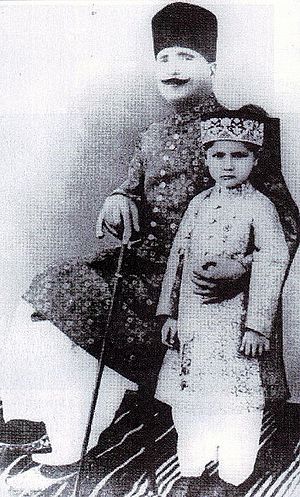
Iqbal married three times. His first marriage was in 1895 to Karim Bibi. They had two children: a daughter, Miraj Begum (1895–1915), and a son, Aftab Iqbal (1899–1979). Iqbal and Karim Bibi later separated, but he continued to support her financially.
His second marriage was to Mukhtar Begum in 1914. They had a son, but both Mukhtar Begum and their son passed away in 1924. Later, Iqbal married Sardar Begum. They had a son, Javed Iqbal (1924–2015), who became a senior judge in Pakistan. They also had a daughter, Muneera Bano (born 1930).
Studying in Europe
Iqbal's teacher, Sir Thomas Arnold, encouraged him to study more in the West. So, in 1905, Iqbal traveled to England. He received a scholarship from Trinity College, Cambridge and earned a Bachelor of Arts degree in 1906. This degree allowed him to practice law. He also became a barrister at Lincoln's Inn.
In 1907, Iqbal moved to Germany for his doctoral studies. He earned a PhD in philosophy from the Ludwig Maximilian University of Munich in 1908. His doctoral paper was titled The Development of Metaphysics in Persia. While in Germany, he learned German quickly and started writing poetry in Persian. He found it easier to express his deep thoughts in Persian.
Career and Philosophy
Academic and Legal Work
After getting his Master's degree in 1899, Iqbal started teaching Arabic at Oriental College, Lahore. Soon after, he became a junior professor of philosophy at Government College Lahore, where he had been a student. He taught there until he left for England in 1905. When he returned in 1908, he rejoined the college as a professor.
Around this time, Iqbal also started working as a lawyer in Lahore. However, he soon left law to focus on his writing. He became an active member of Anjuman-e-Himayat-e-Islam, an organization that supported Muslims.
Iqbal's writings often focused on the spiritual growth of human society. He was greatly influenced by Western thinkers like Nietzsche and Goethe, but even more so by the poetry and philosophy of Rumi. Iqbal believed that Islam could guide people towards freedom and greatness. He wanted Muslims to remember their glorious past and unite as one global community, or Ummah.
His poetry was translated into many European languages. For example, Asrar-i-Khudi and Javed Nama were translated into English.
Iqbal was also a well-known lawyer. He appeared in the Lahore High Court for many cases, both civil and criminal. More than 100 of his cases are recorded.
Final Years and Passing
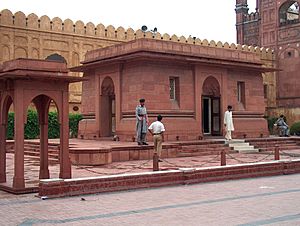
In 1933, after traveling to Spain and Afghanistan, Iqbal became ill with a throat problem. He spent his last years helping to set up the Dar ul Islam Trust Institute. This institute aimed to support studies in classical Islam and modern social science. He also strongly supported the idea of an independent Muslim state.
Iqbal stopped practicing law in 1934 and received a pension from the Nawab of Bhopal. He often visited the shrine of the Sufi saint Ali Hujwiri in Lahore for spiritual guidance. After suffering for months, Iqbal passed away in Lahore on 21 April 1938. His tomb is located in Hazuri Bagh, between the Badshahi Mosque and the Lahore Fort. The Government of Pakistan provides official guards for his tomb.
Political Vision
Early Political Involvement
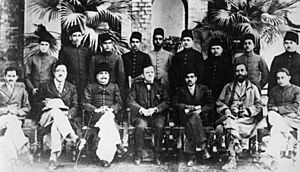
(L to R): M. Iqbal (third), Syed Zafarul Hasan (sixth) at Aligarh Muslim University.
Iqbal became interested in politics when he was young. After returning from England in 1908, he gained recognition from important people in Punjab. He joined the All-India Muslim League and became one of its first joint secretaries. While working as a lawyer and writing poetry, he remained active in the Muslim League.
He did not support India's involvement in World War I. He stayed in touch with Muslim political leaders like Mohammad Ali Jouhar and Muhammad Ali Jinnah. He believed the main Indian National Congress party was too dominated by Hindus. He was also involved in the Khilafat Movement.
In 1926, Iqbal was elected to the Punjab Legislative Assembly. He supported Jinnah's ideas to protect Muslim political rights. He worked with other Muslim leaders to unite the Muslim League.
Iqbal, Jinnah, and Pakistan
Iqbal felt disappointed with the Muslim League's politicians in the 1920s. He came to believe that only Muhammad Ali Jinnah could unite Muslims and help them gain political power. Iqbal wrote many letters to Jinnah, encouraging him to return to India from London and lead the League.
In 1930, Iqbal suggested the idea of Muslim-majority provinces in India. Jinnah officially adopted the goal of Pakistan in 1940. Some historians believe Iqbal's letters greatly influenced Jinnah's decision to support the idea of Pakistan. Iqbal constantly encouraged Muslim leaders and people to support Jinnah and the League.
Revival of Islamic Ideas
Iqbal gave six lectures in English, which were published in 1930 as The Reconstruction of Religious Thought in Islam. In these lectures, he talked about Islam's role as a religion and a political system in modern times. He criticized Muslim politicians he saw as misguided and too focused on power.
Iqbal worried that secularism would weaken Islam's spiritual foundations. He also feared that India's Hindu-majority population would overshadow Muslim culture. During his travels, he promoted the idea of greater Islamic political cooperation and unity. He believed Muslim nations should set aside their differences.
In his 1930 speech as president of the Muslim League, Iqbal stressed that Islam is not just a religion but also a complete way of life with "legal concepts" and "civic significance." He said that building a society without Islamic principles was "unthinkable" for a Muslim.
He became the first politician to clearly state the Two-nation theory. This theory says that Muslims are a separate nation and deserve their own political independence from other groups in India. He believed Muslims would suffer in a single Indian union.
Iqbal spent the later part of his life focused on political activities. He traveled to Europe and West Asia to gain support for the Muslim League. He gave speeches and wrote articles to unite Muslims across India.
Tolu-e-Islam Magazine
Iqbal was the first supporter of Tolu-e-Islam, a magazine about Muslim history, politics, and culture in British India. He wanted a journal to spread his ideas and the goals of the All-India Muslim League. In 1935, the journal was started and named after Iqbal's poem "Tulu'i Islam". This magazine played an important role in the movement for Pakistan.
Literary Contributions
Persian Poetry
Iqbal wrote most of his poetry in Persian. Out of his 12,000 verses, about 7,000 are in Persian. In 1915, he published his first collection of poems, Asrar-i-Khudi (Secrets of the Self). These poems focus on the spirit and self from a religious point of view. Many people consider this his best poetic work. In Asrar-i-Khudi, Iqbal explains his idea of "Khudi," or "Self." He believed that the goal of life is to understand oneself.
In Rumuz-i-Bekhudi (Hints of Selflessness), published in 1917, Iqbal argued that the Islamic way of life is the best for a nation to survive. He said that a person should keep their unique qualities but also be willing to sacrifice their goals for the good of the nation. These poems talk about the ideal community and Islamic principles.
Iqbal's 1924 book, Payam-e-Mashriq (The Message of the East), was inspired by the German poet Goethe. Iqbal's work reminds the West about the importance of morality and religion. He says that people can only reach higher levels if they understand spirituality.
Zabur-e-Ajam (Persian Psalms), published in 1927, includes poems like "Gulshan-e-Raz-e-Jadeed" ("Garden of New Secrets"). In this, Iqbal asks questions and answers them using old and new wisdom. He also wrote "Bandagi Nama" ("Book of Slavery"), which speaks against slavery.
Iqbal's 1932 work, Javed Nama (Book of Javed), is named after his son, Javed. In this book, Iqbal imagines himself guided by Rumi through different heavens. He criticizes Muslims who betrayed their country to the British colonists. At the end, he speaks to young people, guiding the "new generation."
Iqbal loved the Persian language. He wrote:
گرچہ ہندی در عذوبت شکر است
garchi Hindi dar uzūbat shakkar ast
طرز گفتار دري شيرين تر است
tarz-i guftar-i Dari shirin tar ast
Translation: Even though Hindi (Urdu) is sweet like sugar, the way of speaking Dari (Persian) is sweeter.
He preferred writing in Persian because it allowed him to express complex ideas and reach a wider audience.
Urdu Poetry
Muhammad Iqbal's first collection of Urdu poetry, The Call of the Marching Bell (bang-e-dara), was published in 1924. It shows three different periods of his life. His early poems, written before 1905, show his love for his country and nature. These include the patriotic "Saare Jahan se Accha" and "Tarana-e-Milli" ("The Song of the Community").
The poems from 1905 to 1908, when he studied in Europe, talk about European society. He felt it had lost its spiritual values. This led him to write poems about the history and culture of Islam. He urged the entire Muslim community, the Ummah, to live by Islamic values.
After 1930, Iqbal mainly wrote in Urdu. His works in this period were often for the Muslim people of India. They focused even more on Islam and Muslim spiritual and political awakening. Bal-e-Jibril (Wings of Gabriel), published in 1935, is considered his best Urdu poetry. It was inspired by his visit to Spain and its Muslim heritage.
Zarb-i-Kalim (The Rod of Moses), published in 1936, is another philosophical poetry book. Iqbal called it his political plan. He argued that modern problems come from the lack of God, materialism, and unfairness in modern society.
Iqbal's last work was Armughan-e-Hijaz (The Gift of Hijaz), published after his death in 1938. It contains poems in both Persian and Urdu. The Persian poems give the feeling that the poet is traveling through the Hijaz in his imagination.
English Writings
Iqbal wrote two books in English: The Development of Metaphysics in Persia (1908) and The Reconstruction of Religious Thought in Islam (1930). He also wrote many letters in English. In these, he shared his ideas about Persian philosophy and Islamic Sufism. He believed that Islamic Sufism helps the soul find a deeper understanding of life. He also discussed philosophy, God, prayer, and other political and social issues.
Punjabi Poems
Iqbal also wrote some poems in Punjabi, like "Piyaara Jedi" and "Baba Bakri Wala." He wrote these in 1929 for his son Javed's birthday. A collection of his Punjabi poetry is displayed at the Iqbal Manzil in Sialkot.
Modern Recognition
"Poet of the East"
Iqbal is often called the "Poet of the East" by scholars and media. Dr. Masoom Yasinzai, a university leader, said that Iqbal is not just a poet of the East but a poet for all humanity.
Iqbal's powerful poetry influenced Muslims in the Indian subcontinent. He believed that Muslims had been held back by Western colonial expansion. Because of this idea, Iqbal is known as the "Poet of the East."
In Pakistan, he is also called Muffakir-e-Pakistan ("The Thinker of Pakistan") and Hakeem-ul-Ummat ("The Sage of the Ummah"). The Pakistani government officially named him Pakistan's "national poet."
Influence in Iran
In Iran, Iqbal is known as Iqbāl-e Lāhorī (Iqbal of Lahore). His books Asrare-i-Khudi and Bal-i-Jibreel are very popular there. Many Iranian scholars believe Iqbal's poetry helped inspire the Iranian Revolution of 1979. During the revolution, people often gathered to listen to his Persian poetry. Because of this, many Iranians of all ages know some of his poems.
Ayatollah Ali Khamenei, a leader in Iran, has praised Iqbal's Persian poetry. He said that even though Iqbal spoke Urdu or English at home, he masterfully put deep philosophical ideas into Persian poetry.
By the early 1950s, Iqbal became well-known among educated people in Iran. The Iranian poet Muhammad Taqi Bahar greatly praised Iqbal's Persian work. In 1952, Iranian Prime Minister Mohammad Mossadeq gave a special radio message on Iqbal Day, praising his role in the struggle of Indian Muslims. In the 1960s, Iqbal's paper on Persian philosophy was translated into Persian.
Iqbal became even more popular in Iran in the 1970s. His verses appeared on banners, and his poetry was read at meetings. He inspired many thinkers, including Ali Shariati. At the first Iqbal Summit in Tehran in 1986, Khamenei said that Iran was "exactly following the path that was shown to us by Iqbal."
Views in the West
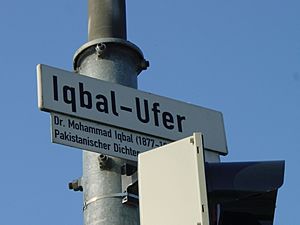
Iqbal's ideas about the Western world have been praised by Westerners. For example, United States Supreme Court Justice William O. Douglas said that Iqbal's beliefs had "universal appeal."
Some critics, like Freeland Abbott, disagreed with Iqbal's views of the West. They said his views were based on imperialism and that he didn't fully understand the benefits of modern democracies and science. However, others argue that Iqbal was educated in Europe and spent enough time there to understand Western civilization well.
Legacy and Commemoration
Iqbal is widely remembered in Pakistan as the person who inspired the idea of the state. Many public places are named after him, such as:
- The Allama Iqbal Campus Punjab University in Lahore
- The Allama Iqbal Medical College in Lahore
- Iqbal Stadium in Faisalabad
- Allama Iqbal Open University in Pakistan
- The Allama Iqbal International Airport in Lahore
In India, his song "Tarana-e-Hind" is often played as a patriotic song that speaks of different communities living in harmony. The Government of Madhya Pradesh in India gives the Iqbal Samman award every year to Indian writers for their contributions to Urdu literature and poetry.
The Pakistani government and other organizations have set up schools and colleges dedicated to Iqbal. They also created the Iqbal Academy Pakistan to study, teach, and preserve his works. His son Javed Iqbal became a justice of the Supreme Court of Pakistan. Javaid Manzil was Iqbal's last home.
Images for kids
See also
 In Spanish: Muhammad Iqbal para niños
In Spanish: Muhammad Iqbal para niños
- Index of Muhammad Iqbal–related articles



